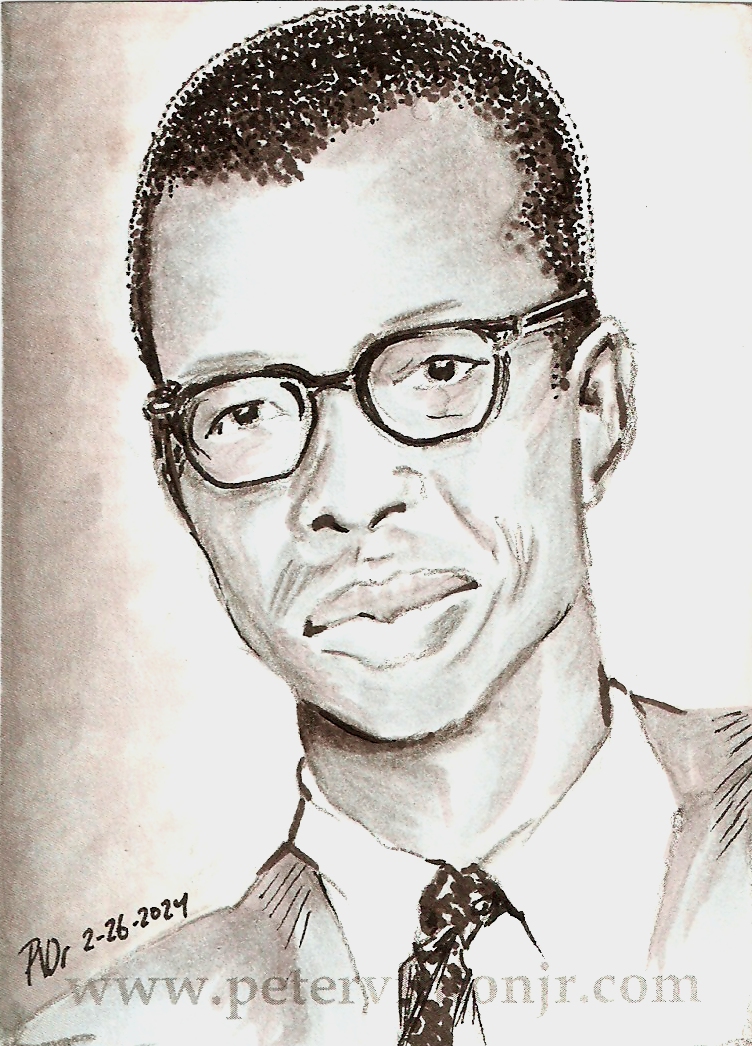Lesson 144:
M. Carl Holman
An ongoing illustrative history study
This piece originally posted 2/26/2024
"As black America approaches the 21st century, our capacity or our failure to build a solid bridge . . . of works will determine whether millions of young blacks already with us or yet unborn will cross over into the new century, or fall into the abyss."
 Another name you almost certainly didn't know: M. (Moses) Carl Holman, civil rights activist, writer, and poet. Born in 1919 St. Louis, Holman showed an early gift for writing, and at the age of 19 won a scriptwriting award from a popular syndicated radio program. He graduated magna cum laude from Lincoln University and went on to acquire Master's degrees from the University of Chicago and from Yale. While at Yale he published his first collection of poems, and began regularly writing articles for various newspapers and magazines on income inequity, urban poverty, literacy, and other issues important to Black Americans. In 1962 he taught English at Clark College in Atlanta, giving him a front-row seat to key events in the earliest days of the civil rights movement. As some of his students participated in sit-ins and the Freedom Rides, he found himself appointed to the U.S. Commission on Civil Rights, of which he eventually became deputy director in 1966.
Another name you almost certainly didn't know: M. (Moses) Carl Holman, civil rights activist, writer, and poet. Born in 1919 St. Louis, Holman showed an early gift for writing, and at the age of 19 won a scriptwriting award from a popular syndicated radio program. He graduated magna cum laude from Lincoln University and went on to acquire Master's degrees from the University of Chicago and from Yale. While at Yale he published his first collection of poems, and began regularly writing articles for various newspapers and magazines on income inequity, urban poverty, literacy, and other issues important to Black Americans. In 1962 he taught English at Clark College in Atlanta, giving him a front-row seat to key events in the earliest days of the civil rights movement. As some of his students participated in sit-ins and the Freedom Rides, he found himself appointed to the U.S. Commission on Civil Rights, of which he eventually became deputy director in 1966.
In 1968 Ebony magazine named Holman as one of the 100 Most Influential Black Americans. That same year Holman published what is probably his best-known work: The Baptizin', a play which won first prize in the National Community Theater Festival. In addition to multiple collections of poems, Holman also published a definitive overview of the civil rights movement in the U.S., from 1965 to 1975.
Perhaps most significantly, in 1971 Holman was named Vice President of the National Urban Coalition. This organization had re-formed in 1967 in the wake of the so-called "long, hot summer" of racial strife and injustices. During this time Holman's singular talent for delivering quiet and polite, but still powerful, speeches came to the fore and he jumpstarted a great many local housing, education, job training, and economic development programs aimed at disadvantaged Black and Hispanic communities.
In his later years Holman forcefully addressed the issue of "dual literacy" for Black children --emphasizing that such students not only needed to be well-versed not only in the fundamentals such as reading, writing, and public speaking; but also in math, science, and technology. His 1988 obituary notes that Holman "had an uncanny ability to form a coalition out of the most diverse elements, and it was often said that the key to his ability to do this was the fact that he never appeared to have an agenda for himself."
Watch a tribute to Holman and his legacy, including anecdotes from his children Kinshasha Holman Conwill, Kwame Holman, and Kwasi Holman, at: https://www.loc.gov/item/2021688186/
Next page - Lesson 145: Mary Jane Patterson
Return to www.petervintonjr.com Main Page
 Another name you almost certainly didn't know: M. (Moses) Carl Holman, civil rights activist, writer, and poet. Born in 1919 St. Louis, Holman showed an early gift for writing, and at the age of 19 won a scriptwriting award from a popular syndicated radio program. He graduated magna cum laude from Lincoln University and went on to acquire Master's degrees from the University of Chicago and from Yale. While at Yale he published his first collection of poems, and began regularly writing articles for various newspapers and magazines on income inequity, urban poverty, literacy, and other issues important to Black Americans. In 1962 he taught English at Clark College in Atlanta, giving him a front-row seat to key events in the earliest days of the civil rights movement. As some of his students participated in sit-ins and the Freedom Rides, he found himself appointed to the U.S. Commission on Civil Rights, of which he eventually became deputy director in 1966.
Another name you almost certainly didn't know: M. (Moses) Carl Holman, civil rights activist, writer, and poet. Born in 1919 St. Louis, Holman showed an early gift for writing, and at the age of 19 won a scriptwriting award from a popular syndicated radio program. He graduated magna cum laude from Lincoln University and went on to acquire Master's degrees from the University of Chicago and from Yale. While at Yale he published his first collection of poems, and began regularly writing articles for various newspapers and magazines on income inequity, urban poverty, literacy, and other issues important to Black Americans. In 1962 he taught English at Clark College in Atlanta, giving him a front-row seat to key events in the earliest days of the civil rights movement. As some of his students participated in sit-ins and the Freedom Rides, he found himself appointed to the U.S. Commission on Civil Rights, of which he eventually became deputy director in 1966.